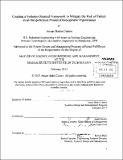Creating a systems-oriented framework to mitigate the risk of failure in an inexperienced product development organization
Author(s)
Badin Castro, Anuar
DownloadFull printable version (10.89Mb)
Other Contributors
Massachusetts Institute of Technology. Engineering Systems Division.
Advisor
Anjali Sastry.
Terms of use
Metadata
Show full item recordAbstract
The recent challenges imposed by the highly competitive global automotive industry have led Ford Motor Company to search for improved product quality, performance and lower costs by leveraging the capabilities offered in developing countries such as Mexico. As demand for automotive engineering services in this country increase rapidly, the interest behind this work is to create a systems-oriented framework applied to the planning, execution and improving phases of the relatively inexperienced Product Development Organization in Mexico, to help achieve what they have defined as success. To develop this framework, first, a systems decomposition approach was applied to a real organizational failure case to evidence the importance of defining the basic inputs of a product development system and its connections during the planning phase, and the optimal type of organization that should execute to achieve its strategic objectives. Second, for the execution phase, two cases were evaluated under a system dynamics approach to illustrate the effect of an inexperienced workforce on the overall productivity of the organization, and a mitigation strategy based on a mentoring and training policy when the only constant is change. Third, for the improving phase, a system dynamics approach was also used to illustrate the importance of embracing the learning capabilities of the organization to improve it execution. The key outcome is a systems-oriented framework to guide an inexperienced manager to achieve success considering the following: Planning the inputs of an organization and maintaining a lightweigh structure approach will enhance high levels of execution responsiveness and quality at reduced costs. Mentoring and training policies while maintaining flexibility, agility and adaptability are key enablers to achieve a low cost execution responsiveness and quality in an inexperienced organization, but such policies reduce its productivity during the initial stages of the policy implementation. Finally, successful organizations are those that work harder to solve urgent issues now, and work smarter to increases its capabilities in the long run improving execution cost, quality and responsiveness.
Description
Thesis (S.M. in Engineering and Management)--Massachusetts Institute of Technology, Engineering Systems Division, 2013. Cataloged from PDF version of thesis. Page 97 blank. Includes bibliographical references (pages 95-96).
Date issued
2013Department
Massachusetts Institute of Technology. Engineering Systems DivisionPublisher
Massachusetts Institute of Technology
Keywords
Engineering Systems Division.